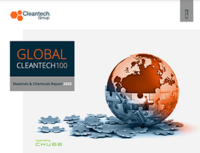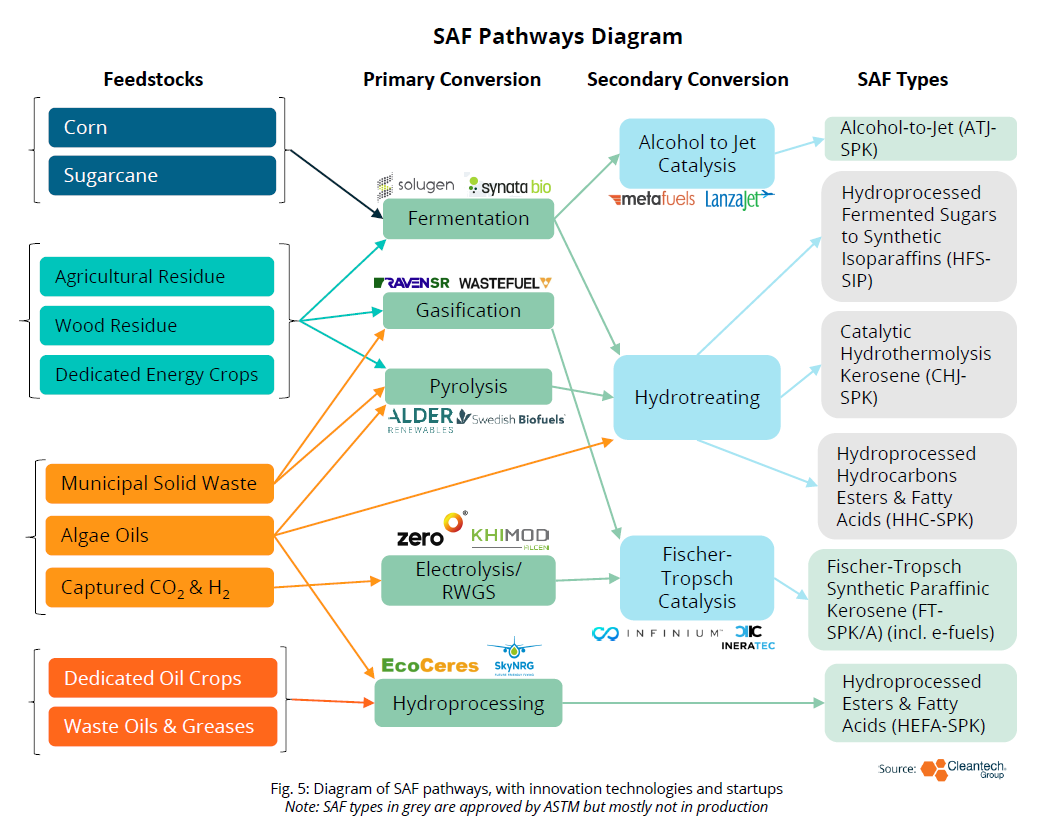Innovation Takes Flight With Sustainable Aviation Fuels
In 2022, the aviation industry accounted for 2% of global CO2 emissions, drawing attention to the industry’s significantly faster rate of emissions growth compared to rail, road, or shipping. As the aviation industry grows exponentially, the pressure is on for country and industry leads to put in place net-zero aviation goals, with the largest opportunity for reduction being via the scaling up of Sustainable Aviation Fuels (SAF). SAFs are alternative fuels, made from non-petroleum feedstocks, which reduce emissions from air transportation by more than 10% compared to traditional jet fuel.
Just last month, Emirates and Virgin Atlantic both made headlines for carrying out demonstration flights powered by 100% SAF. While these are major milestones, they highlighted the need for further technological advancements to scale up SAF. Indeed, there is high potential for innovation in SAF, with start-ups capitalizing on various segments of the value chain, receiving investments and partnering with airlines via production and offtake agreements.
Recent Deals and Partnerships from November 2023:
- Infinium received $75M in Growth equity from Breakthrough Energy Catalyst to support Project Roadrunner, which will convert waste CO2 and renewable power into SAF and other low-carbon fuels. Along with the investment, there will be a fuel offtake agreement with American Airlines and further financial support from Citi.
- SkyNRG received $190M in Growth equity from Macquarie Asset Management’s GIG Energy Transition Solutions Fund. The funds will be used to build SAF facilities in Europe and the U.S. by 2030.
- ‘Project Speedbird’, a collaboration between Nova Pangaea, LanzaJet, and British Airways, has secured $11M in government funding for SAF production. The SAF will be developed using Nova Pangea’s technology that converts agricultural waste and wood residue feedstocks into ethanol, and LanzaJet’s technology that converts ethanol into SAF.
- Zero Petroleum partnered with Boeing to jointly establish a testing program for Zero’s SAF at the University of Sheffield’s Energy Innovation Centre (EIC) and its SAF research facility.
- ‘Flight100’, a collaboration by a Virgin Atlantic-led consortium, including Boeing, Rolls-Royce, Imperial College London, University of Sheffield, ICF, and Rocky Mountain Institute, in partnership with the UK Department for Transport, flew a 100% SAF commercial flight.
Under the International Aviation Transport Authority (IATA) net-zero emissions goals set in May 2021; 38 airlines have committed to net-zero emissions by 2050. It is expected that approximately 65% of current emission levels would be abated by SAF and the industry will need 330-445 million tons of SAF per year by 2050 in order to achieve this goal. Several different pathways for SAF production have been explored, involving various feedstocks and technologies.
Nine pathways for commercial-scale SAF have been approved by the American Society of Testing and Materials (ASTM), with blending rates of 10-50% with traditional jet fuel. HEFA is currently the only commercially deployed pathway but has limitations with scaling up due to its inherent dependance on feedstock availability. Alcohol-to-jet pathways and Fischer-Tropsch processes are in commercial pilot stages and show promise in scaling up.
Policies such as the ReFuelEU Aviation Initiative, the Inflation Reduction Act tax credits in the U.S., and other countries’ blending mandates are expected to drastically increase the production of SAF in coming years. Due to the several emerging policies, the cost of inaction, such CO2 non-compliance costs will soon outweigh conventional jet fuel cost savings for airlines.
While strong policy initiatives and social concern over carbon emissions are driving airlines to increase their SAF adoption, several economic and technical barriers exist that are preventing the immediate scaling up of the SAF market. The most significant economic barrier is that currently, SAF is approximately 2-5 times more expensive than traditional fuel costs and requires favorable tax and subsidy policies to become feasible for airlines to use in the short-term. Some key technical barriers are:
- Maximum blending regulations of 50%
- Overall scarcity of waste-based feedstocks
- A lack of aromatics included in current Fischer-Tropsch pathways
- The amount of renewable energy required to convert electricity into cleaner fuels.
Innovation by start-ups and incumbents are helping to bridge the gap between SAF technologies and commercially-viable pathways. For example, biomass refining innovation broadens potential feedstocks that can be used for SAF production. The National Renewable Energy Laboratory (NREL) is facilitating start-ups, such as Alder Renewables and Lanzajet, and incumbents to use their facilities to pilot refinery technology. With regard to primary conversion innovation, start-ups such as Twelve and Dioxycle are innovating methods to enable the production of syngas without the need for the reverse water gas shift process.
In jet fuel production innovation, producers are experimenting with a range of catalyst and conversion technologies to reduce energy requirements and the need for aromatic additives. For example, OXCCU is working on one step production of jet fuel from syngas to reduce capital costs and energy usage via process optimization. Other innovations include those in more efficient conversion of methanol-to-jet processes (e.g., Metafuels), modular reactors to enable decentralized production (e.g., Ineratec), and alternative alcohol-to-jet production to produce aromatics (e.g., Universal Fuel Technologies).
Next Steps to Look Out For:
- As more hubs for hydrogen production and carbon capture are being developed globally, there is more opportunity for new pathway innovation with hydrogen and CO2
- More innovation to ensure that SAF can be used as a drop-in replacement for traditional jet fuels such that aircraft engines do not need to be modified to use it
- Relatively early-stage technology for e-fuels means that we can expect more breakthroughs in multi-step energy conversion processes.
Sunena Gupta, Research Analyst at Cleantech Group, discusses her research into Sustainable Aviation Fuels (SAFs) and how after decades of research and millions of dollars invested, the technical challenges of decarbonizing aviation fuel have been replaced by optimism and structured plans for production.




